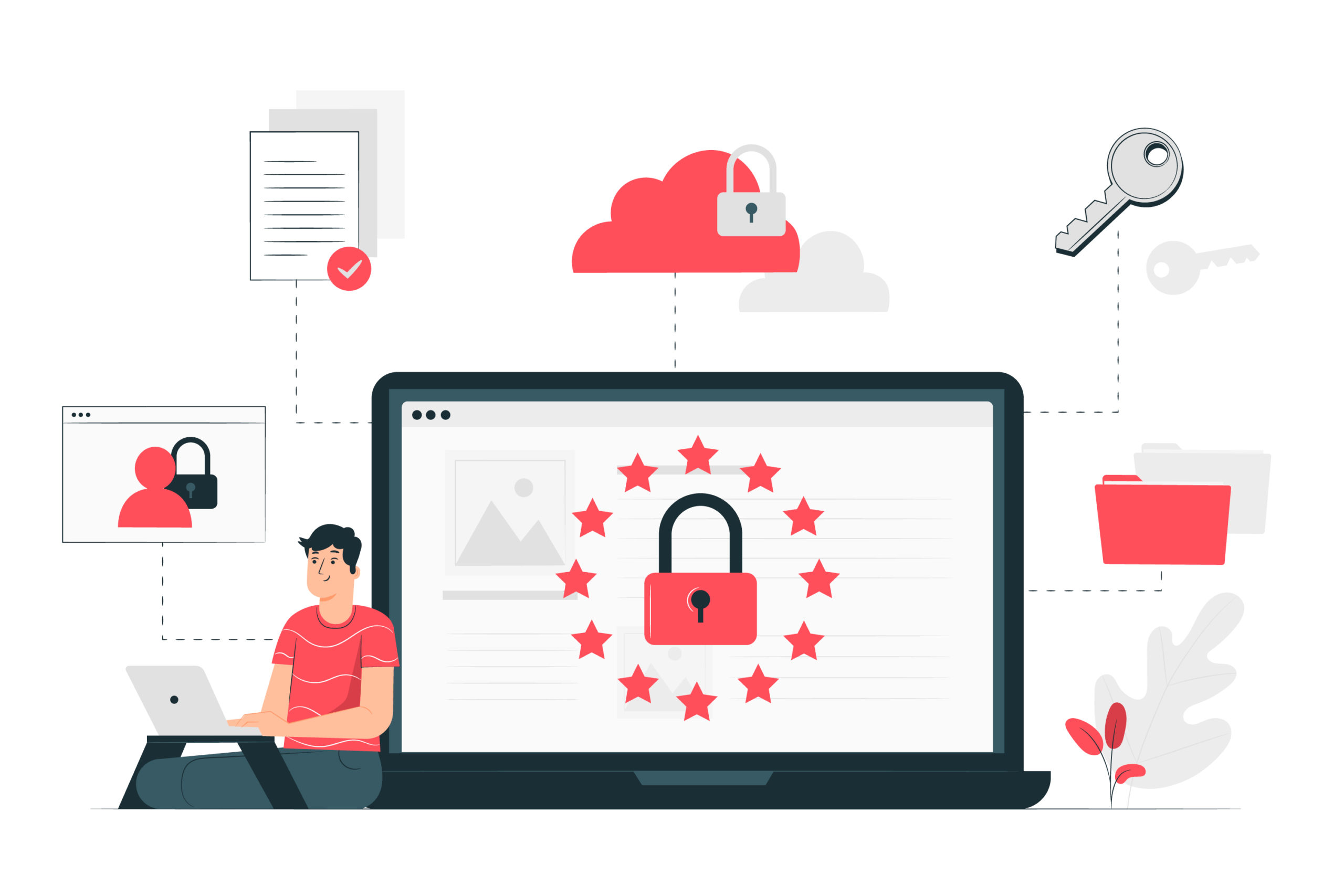Top 15 Essential Security Tips for Remote Workers

In recent years, remote work has experienced a tremendous surge in popularity, offering employees flexibility and convenience. However, this shift towards remote work has also exposed workers and organizations to new security challenges. Ensuring the safety and security of both personal and company data is of paramount importance. To help you navigate the world of remote work securely, we have compiled the top 15 essential security tips for remote workers.
Security tips for remote workers

In today’s digital age, remote work has become a common practice, offering flexibility and convenience. However, with this convenience come new security challenges that remote workers need to address to protect themselves and their organizations. Here are some essential security tips for remote workers:
1. Safeguard Your Home Network
Bad folks on the internet often try to sneak into home networks because many folks forget to change their router’s default password. This can make your home network easy prey for cyber-criminals. It is best among security tips for remote workers.
One easy way to boost your home network’s safety is to change your router’s password from the default one to something unique. This makes it much harder for the bad guys to get in.
But that’s not all you can do. It’s also important to install updates for your router’s software, called firmware. This way, any known weak points that hackers could use to break in get fixed. So, don’t forget to keep your router up to date to stay safe online!
2. Lock Your Device When You Step Away
In security tips for remote workers comes that whenever you leave your computer or phone unattended, like in your home office, a coffee shop, or a co-working space, it’s a smart move to lock it. The thing is, we humans tend to forget to do that.
But don’t worry! Most devices these days have a handy feature called “automatic locking.” It’s like a security buddy that kicks in when you’re not looking.
All you have to do is set a time limit for how long your device waits before it locks itself. Make sure it’s long enough that you’re not annoyed (like 30 seconds for phones) but not so long that it’s risky (like five minutes for laptops).
The good news is that automatic locking usually comes turned on by default for most modern devices. So, just set it up once, and you’re good to go!
3. Stay Safe with Antivirus Software
Imagine antivirus software as your computer’s guardian. It’s like a superhero that keeps your computer safe from nasty things like viruses, spyware, ransomware, and other bad stuff. This is among other security tips for remote workers.
Here’s how it works: When you have antivirus software installed, it’s on the lookout for any sneaky viruses. If it finds one, it doesn’t just say hello; it goes to work and kicks that virus out of your computer.
But here’s the cool part: The best antivirus software doesn’t stop there. It also acts like a shield, making sure no new viruses can sneak in. It’s like having a bodyguard for your computer, keeping it safe from harm. So, antivirus software is like your computer’s superhero friend, always watching out for trouble!
You can also read – Malware vs Viruses: A Comprehensive Comparison 2023
4. Stay Secure with a VPN

Think of a Virtual Private Network (VPN) as your secret tunnel on the internet. It’s like having a hidden pathway that makes your online activities super safe.
Here’s how it works: When you use a VPN, it creates a secure and secret connection to a special network. It’s like having your own private road, even when you’re on a busy highway (the public internet). This way, when you send or receive data, it’s protected and locked away from prying eyes.
They are like your personal bodyguards online. They keep you safe, especially when you’re using public Wi-Fi. They also let you access important stuff on your work computer from far away, like a digital superhero.
But that’s not all! They are like your online disguise. They make it tough for sneaky hackers to spy on what you’re doing or pretend to be you (MITM attacks). They also keep websites from knowing exactly where you are and stop your internet provider from snooping on your online moves. So, with a VPN, your online life stays private and secure!
You can also read – 5 Ways to Boost Mobile Device Security – Know It All!!
5. Enable Two-Factor Authentication (2FA)
It’s a smart move to enable Two-Factor Authentication (2FA) whenever you can for your online accounts. Here’s why: 2FA is like having an extra lock on your digital doors. It makes your accounts super secure by asking for not just your regular password but also a second code, often sent to your phone. So, even if someone guesses your password, they can’t get in without that special code. It’s like having an extra layer of protection that keeps your accounts safe and sound. So, go ahead and turn on 2FA whenever you have the chance to add an extra shield to your online world.
6. Encrypt your device
“If your employer hasn’t already enabled encryption for your device, it’s crucial that you take the initiative to do so, as it is among security tips for remote workers. Encryption plays a vital role in reducing security risks associated with lost or stolen devices by ensuring that unauthorized individuals cannot access your device’s contents without the appropriate password, PIN, or bio-metrics.
Encryption involves the process of encoding information in a way that only authorized parties can decipher it. While it may not prevent all types of attacks, such as interference or man-in-the-middle attacks, it effectively denies any interceptor access to intelligible content.
The process for enabling encryption varies depending on your device’s operating system:
- Windows: Activate BitLocker.
- macOS: Enable FileVault.
- Linux: Utilize dm-crypt or a similar encryption method.
- Android: Encryption has been enabled by default since Android 6.
- iOS: Encryption has been enabled by default since iOS 8.
By turning on encryption, you take a significant step towards safeguarding your data and enhancing the overall security of your device.”
7. Keep your operating system up-to-date
One of the tips among security tips for remote workers is to keep your operating system up-to-date. Even when using a supported operating system, there can be notable delays between discovering a vulnerability and resolving it. To mitigate this risk effectively, it’s essential to ensure that all your devices promptly apply security patches. The best practice is to opt for automatic updates whenever possible.
While many modern devices are configured to automatically install updates by default, you may occasionally need to permit your computer to restart in order to finalize the patching process.
8. Develop a new routine
When you’re working from home, it’s important to change up your routine a bit. Not only do you need to make sure your online stuff is safe, but you also want to structure your day well and keep in touch with your team. If you’re used to saying hello to your coworkers in the morning, you can keep that going by sending them an email or chatting with them online.
Why is this important? Well, working from home can sometimes make you lose your focus or feel a bit lonely. So, it’s a good idea to take some steps to prevent that. Don’t forget to reach out and stay connected with your colleagues. Even though things might be different because of the coronavirus, you still have a job to do.
9. Buy a webcam cover

One of the security tips for remote worker is to buy a webcam cver. It’s a good idea to buy a webcam cover, and they’re not costly at all. This helps protect your privacy because sometimes sneaky cybercriminals can take control of your webcam and watch you without your permission. But if you use a webcam cover, they won’t be able to see anything.
Also, the security software you use on your computer can help keep you safe. It can let you know if someone is trying to use your webcam without your permission and block them from doing so.
10. Stay connected with your employers
If you are going through to learn some security tips for rmeote workers then you are at a right place. It’s a good idea to keep an eye on your work emails. Sometimes, you’ll get emails with important information like new rules about when you need to work or any travel updates. If you’re not sure about something, don’t hesitate to ask questions.
11. Use your company’s tech toolbox
Many companies provide special tech tools to make your work-from-home setup safer. This could include giving you company laptops and mobile devices. These devices usually come with extra security stuff like firewalls and antivirus protection. They also have things like VPN (which helps keep your internet connection secure) and 2-factor authentication (which adds an extra layer of security to your accounts).
12. Use zoom meeting safely
You’ve likely used tools like Zoom, Microsoft Teams, and Google Meet. These are online video chat programs that have become really important for people to talk, work together, and have meetings during the pandemic.
Even if you keep working from home after the pandemic, you’ll likely still use these programs. So, it’s a good idea to make sure they’re safe and secure.
13. Control the impulse to improve
When you work with your coworkers in a team, you might use tools like instant messaging and video meetings. Sometimes, if a tool isn’t working well, you might think about getting a different one. But be careful not to do that. If you download a new tool, it could have a security problem, and that could let someone who shouldn’t access your work stuff or any personal stuff on your device.
14. Beware of Phishing Emails
Sometimes, bad people send fake emails with harmful links to employees. Here’s what happens: The emails may seem like they’re from important people in your company, and they might ask you to click a link to see a new company policy. But if you click that link, you could end up downloading bad stuff onto your device. So, don’t click it! Instead, tell your boss right away if you get an email like that.
You can read – 10 Facts About Phishing That You Should Know.
15. Back-up your work information.
It’s really important to keep copies of all your important work stuff like reports, data, files, and research. You don’t want to lose all the hard work you’ve done if something goes wrong with your home laptop, like a malware attack.
A good idea is to save copies of your work in a safe place on the internet, called cloud storage. Your company might even give you access to a special cloud storage site from companies like Dropbox, Idrive, or Backblaze. This way, your work stays safe and you can access it from anywhere.
Conclusion
In conclusion, safeguarding your digital workspace as a remote worker is paramount in today’s interconnected world. By following these security tips for remote workers diligently, you can significantly reduce the risk of cyber threats and protect sensitive information. Remember to secure your devices, use strong passwords, implement multi-factor authentication, and stay vigilant against phishing attempts.
Additionally, keep your software and systems up to date, enable encryption for your devices, and be cautious when using public Wi-Fi networks. Regularly back up your data, stay informed about the latest security threats and educate yourself on best practices.
By making cyber security a top priority and incorporating these practices into your daily routine, you can work remotely with confidence, knowing that you are taking the necessary steps to protect your data and maintain a secure digital environment.
You can read: 5 Ways to Boost Mobile Device Security – Know It All!!
FAQs
How do you maintain security when employees work remotely?
Secure remote work with strong passwords, encryption, training, VPNs, regular updates, and monitoring to protect data and systems.
What are the examples of security tips for remote workers?
Use strong passwords, enable multi-factor authentication, update software, encrypt devices, avoid public Wi-Fi, educate on phishing, and back up data.
How security tips for remote workers will help employees?
Security tips for remote workers enhance data protection, reduce cyber threats, safeguard personal and company information, and create a secure WFH environment.






